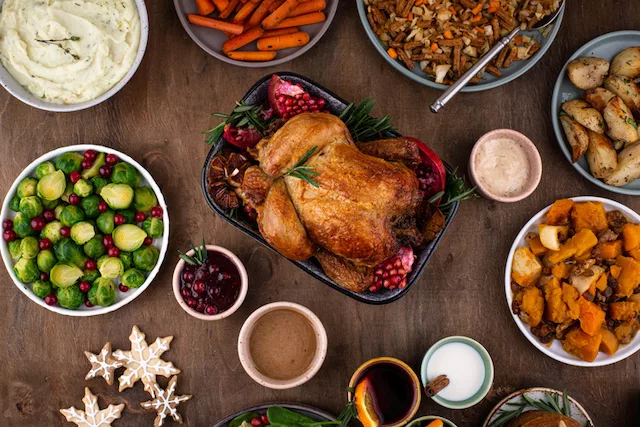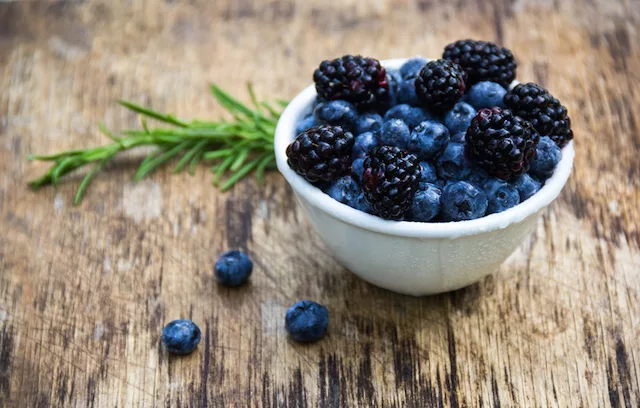
The weeks between Thanksgiving and New Year’s are usually filled with delicious treats and boozy parties, not to mention plenty of family time. Here’s how to maintain a healthy diet and keep your digestive system happy with gut-healthy foods, without giving up all the fun. Spoiler: It’s all a matter of what you add to your plate. Not what you take off.

With the holiday season quickly approaching, you may be wondering how the upcoming celebrations may affect your health—specifically, your gut health. After all, the most wonderful time of the year is also the most filled with food and alcohol. The holidays can also be very stressful and take us out of our usual routines; Two additional things can take their toll on the digestive system.
“Due to additional family events and travel, people tend to be very tired, stressed, and out of sync with their usual routine during the holiday season,” explains Amy Shapiro, MS, RD, founder of the Manhattan-based dietetics practice. real nutrition. “As a result, some people don’t eat enough and rely solely on coffee to fuel their days. While others may only have time to consume processed foods that lack beneficial gut nutrients such as fiber and probiotics.” Shapiro also says that the rush of parties synonymous with the season often means we collectively consume more sugary desserts and alcohol, which can negatively affect the balance of good and bad bacteria in the gut.
The importance of intestinal health
While a few indulgent meals here and there won’t make any long-term changes to your gut health, problems can arise when indulging becomes the status quo, explains gut health nutrition expert. Amanda Sauceda.
“The gut microbiome is made up of trillions of bacteria that break down fiber in food. This process produces short-chain fatty acids (SCFAs), which help keep the gut healthy and support other areas of well-being, including bone health and immunity. When the intestine does not get the fiber it needs to produce SCFA, it can cause an imbalance between good and bad bacteria in the intestine,” explains Sauceda.
The first signs of an imbalanced gut microbiome are often related to digestion. “You may feel bloated or experience constipation or diarrhea. You may also find that foods you’ve never had a problem with are apparently irritating your gut,” Sauceda says.
If you notice any of these signs, it’s time to take steps to improve the overall balance of good and bad bacteria in your gut through your diet.
Maintain good intestinal health day by day during the holidays with gut-friendly foods
Sure, all the parties and indulgent dinners can make it difficult to feed your gut the nutrients it needs, but it’s definitely possible; all you need is a little planning. But no matter what, don’t stress too much about your diet; that will only negatively affect your microbiome. Do the best you can!

“I think people get really scared about their diet during the holidays, and that creates more stress, which is bad for gut viruses in itself,” says Isabel Smith, RD, CDN, founder of Nutrition Isabel Smith. “So, first and foremost, don’t think too much about your diet; Just do your best to incorporate fibrous foods like fruits, vegetables, and whole grains when you’re not celebrating. This way, more indulgent foods and drinks will impact your gut bacteria less when you decide to consume them. “Small steps can have a big impact!”
Shapiro agrees, noting that focusing on meals you probably have the most control over, like breakfast, lunch, and snack, can make a big difference. “The key is to maximize the fiber in those meals to keep your gut happy,” he says.
Some easy ways approved by Smith and Shapiro to incorporate more fiber into your daily life include:
- Add frozen cauliflower or spinach to your smoothies
- Add vegetables to omelettes and other foods; have frozen options on hand to make this easier
- Add Berries and Seeds to Greek Yogurt
- Swap cereal for oatmeal for breakfast
- Top toast or bagels with avocado and kimchi instead of cream cheese
- Eat vegetables with hummus or an apple with nut butter
- Roast a large amount of vegetables to use in meals during the weak.
If the thought of adding more fiber to your diet stresses you out, Sauceda recommends focusing on maintaining your status quo. “Life and food may be different during this time of year, but a good gut goal is to keep it as much the same as possible in terms of diet. Your gut likes consistency, particularly with foods with fiber, so when the holiday season hits, try to keep regular fiber-filled foods in your meals.”
The role of supplements and exercise With gut-friendly foods
If you’re worried about not getting enough fiber during the holiday season, adding a supplement to your routine can aid digestion and keep your gut bugs happy. “Certain supplements can help maintain gut health and prevent you from feeling sluggish and bloated. Just be sure to work with a health professional who can recommend what is best for you,” says Smith.
Shapiro agrees, noting that the holiday season is a good time to start taking a probiotic supplement. “It can ensure that you are supporting your gut health during times of decreased nutrition and increased exposure to germs,” she explains. “A probiotic with a prebiotic could be helpful if you’re not eating or meeting your fiber goals,” she adds.
Movement can also help with digestion. “It helps keep the intestines regular and helps promote healthy bacteria in the intestine,” Sauceda notes. “A walk with your family after the holiday meal or even taking a few steps in your office after a shared meal can go a long way.”
Gut-friendly Christmas dishes and ingredients
Attending a party or organizing a meeting? You probably have something to cook! So why not prepare some gut-healthy dishes and add them to the variety of nutrient-dense foods listed below?
Oatmeal
Oats contain a type of soluble fiber called beta-glucan. It forms a gel-like substance in the intestine that helps maintain regularity, Sauceda explains. “I love oats because you can use them to make sweet or savory dishes.”
Sauceda recommends using oats to create a delicious fruit crumble topping or combining them with onions and chicken broth to make a Scottish stuffing alternative called skirt.
Bulgur
Bulgur is a good source of gut-friendly dietary fiber and is the perfect ingredient for a holiday side dish, Sauceda says. “You can mix this grain with some vegetables to add even more flavor and fiber.”
Interested in trying something like this? Consider preparing this platewhich combines bulgur with roasted vegetables, golden raisins, feta cheese and a blend of delicious spices.
Berries
“Raspberries, blackberries, blueberries and strawberries are high in fiber and low in sugar. They are also rich in antioxidants that decrease inflammation,” says Shapiro.
Make berries part of your Christmas dessert by placing them on a tray alongside chocolate truffles and festive cookies. Alternatively, add them to a salad or make a beautiful red fruit sauce Serve with main protein or alongside chips as an appetizer, suggests Shapiro.

miso
Miso is a fermented paste made from soybeans that is full of beneficial bacteria that are great for gut bugs. “If you can, look for a brand that adds probiotics, which can also help maintain gut health,” says Smith.
Miso is a tasty addition to holiday sauces, dressings, and soup bases, Smith tells HUM. “A little goes a long way, which is good since miso is also high in sodium,” he adds. Try adding it to your Christmas menu with this one Miso-Maple Salmon recipe.
Lentils
Prebiotics are a type of fiber that feeds the “friendly” bacteria in your gut, and lentils are a great source of them, Sauceda says. She recommends adding pumpkin stuffed with lentils to your Christmas table this year. “It’s really delicious and adds some satisfying protein to a side dish that otherwise wouldn’t have any.”
Yoghurt
“Greek yogurt contains probiotics that can help maintain a healthy gut microbiome,” says Shapiro. “I recommend incorporating it into a vegetable sauce for your next party instead of a sour cream-based recipe. Nobody will know!”
Chard
“Chard is a seasonal winter vegetable that contains fiber and antioxidants to help balance our gut microbiome and combat free radicals in the body,” explains Shapiro. For an easy-to-make, heart-healthy holiday side dish, Shapiro recommends sautéing the vegetables and topping them with pomegranate seeds. Get step-by-step instructions here.
Onions
Another great source of prebiotics, onions, are a versatile ingredient to add to tasty holiday dishes, says Smith. Use them to make a delicious side dish like this one. Roasted Mushroom and Onion Dish with Gorgonzola of Food and Wine. Or try this French Onion Chicken Recipe by Skinnytaste.
The gut-friendly takeaway?
Maintaining a healthy gut microbiome during the hectic holiday season can be challenging, but not impossible. It just requires a little planning and is worth the effort.
By taking the time to eat gut-healthy foods, you’re taking steps to keep uncomfortable side effects like bloating, constipation, and diarrhea at bay, so you can enjoy celebrating with your loved ones.







